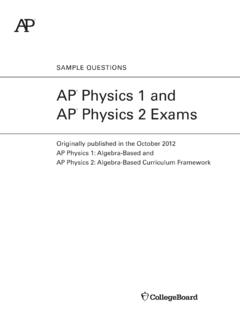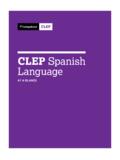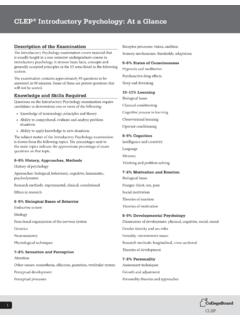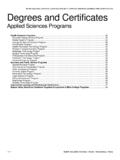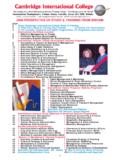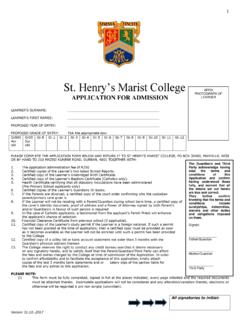Transcription of ENGLISH LANGUAGE AND COMPOSITION - …
1 ENGLISH . LANGUAGE AND. COMPOSITION . Course Description Effective Fall 2014. AP Course Descriptions are updated regularly. Please visit AP Central . ( ) to determine whether a more recent Course Description PDF is available. ENGLISH . ENGLISH . LANGUAGE AND. LANGUAGE AND. COMPOSITION . COMPOSITION . Course Description Course Description Effective Fall 2014. Effective Fall 2014. The college Board New York, AP Course NYare updated regularly. Please visit AP Central Descriptions . ( ) to determine whether a more recent Course Description PDF is available. AP ENGLISH LANGUAGE and COMPOSITION Course Description, Effective Fall 2014. About the college Board The college Board is a mission-driven not-for-profit organization that connects students to college success and opportunity. Founded in 1900, the college Board was created to expand access to higher education. Today, the membership association is made up of over 6,000 of the world's leading educational institutions and is dedicated to promoting excellence and equity in education.
2 Each year, the college Board helps more than seven million students prepare for a successful transition to college through programs and services in college readiness and college success including the SAT and the Advanced Placement Program . The organization also serves the education community through research and advocacy on behalf of students, educators, and schools. For further information, visit AP Equity and Access Policy . The college Board strongly encourages educators to make equitable access a guiding principle for their AP programs by giving all willing and academically prepared students the opportunity to participate in AP. We encourage the elimination of barriers that restrict access to AP for students from ethnic, racial and socioeconomic groups that have been traditionally underserved. Schools should make every effort to ensure their AP classes reflect the diversity of their student population. The college Board also believes that all students should have access to academically challenging course work before they enroll in AP classes, which can prepare them for AP success.
3 It is only through a commitment to equitable preparation and access that true equity and excellence can be achieved. AP Course Descriptions AP course descriptions are updated regularly. Please visit AP Central . ( ) to determine whether a more recent course description PDF is available. 2014 The college Board. college Board, Advanced Placement Program, AP, AP Central and the acorn logo are registered trademarks of the college Board. All other products and services may be trademarks of their respective owners. Visit the college Board on the Web: 2014 The college Board Return to the Table of Contents 2. AP ENGLISH LANGUAGE and COMPOSITION Course Description, Effective Fall 2014. Contents 5 About AP . 6 Offering AP Courses and Enrolling Students 6 How AP Courses and Exams Are Developed 6 How AP Exams Are Scored 7 Using and Interpreting AP Scores 7 Additional Resources 8 AP ENGLISH Program 9 Introduction to AP ENGLISH LANGUAGE and COMPOSITION 9 Prerequisites 10 Reading Level of Course Texts and Volume of Reading 10 Expectations for Writing Ability 11 AP ENGLISH LANGUAGE and COMPOSITION Course Overview 11 Course Goals 13 AP Course Audit and Curricular Requirements 15 Course Curriculum 15 General Learning Objectives 17 Instruction 17 Ways to Organize Instruction 17 Key Principles for Course Organization 19 Instructional Strategies 21 Reading 21 Use of Rhetorical Terminology 21 Rhetorical Reading 22 The Rhetorical Triangle 23 Aristotelian Rhetorical Analysis 24 Selecting Readings for the AP ENGLISH LANGUAGE and COMPOSITION Course 27 Images as Texts 29 The Role of Technology and Textbooks 29 Technology 29 Textbooks 2014 The college Board Return to the Table of Contents 3.
4 AP ENGLISH LANGUAGE and COMPOSITION Course Description, Effective Fall 2014. 31 Writing 31 Writing from Source Materials 31 Organization of Writing 31 Writing Process 32 Argumentation 34 Teaching LANGUAGE , Grammar, and Style in AP ENGLISH LANGUAGE and COMPOSITION 36 Synthesis 37 Step 1: Authentic Inquiry 37 Step 2: Linking the Sources 37 Step 3: The Source-Informed Argument 39 Classroom Assessments 39 Formative and Summative Assessment 40 Portfolios 41 Feedback 43 college Board Resources 44 Connections Between AP ENGLISH LANGUAGE and COMPOSITION and AP Capstone 45 The AP ENGLISH LANGUAGE and COMPOSITION Exam 46 Summary of Scoring Rubrics 47 Sample AP ENGLISH LANGUAGE and COMPOSITION Exam Questions 47 Sample Multiple-Choice Questions 64 Answers to Multiple-Choice Questions 65 Sample Free-Response Questions 78 References 79 AP ENGLISH LANGUAGE and COMPOSITION Course at a Glance 2014 The college Board Return to the Table of Contents 4. AP ENGLISH LANGUAGE and COMPOSITION Course Description, Effective Fall 2014.
5 About AP.. AP enables students to pursue college -level studies while still in high school. Through more than 30 courses, each culminating in a rigorous exam, AP provides willing and academically prepared students with the opportunity to earn college credit and/or advanced placement. Taking AP courses also demonstrates to college admission officers that students have sought out the most rigorous course work available to them. Each AP course is modeled upon a comparable college course, and college and university faculty play a vital role in ensuring that AP courses align with college -level standards. Talented and dedicated AP teachers help AP students in classrooms around the world develop and apply the content knowledge and skills they will need later in college . Each AP course concludes with a college -level assessment developed and scored by college and university faculty and experienced AP teachers. AP Exams are an essential part of the AP experience, enabling students to demonstrate their mastery of college -level course work.
6 Most four-year colleges and universities in the United States and universities in more than 60 countries recognize AP in the admission process and grant students credit, placement, or both on the basis of successful AP. Exam scores. Visit to view AP credit and placement policies at more than 1,000 colleges and universities. Performing well on an AP Exam means more than just the successful completion of a course; it is a gateway to success in college . Research consistently shows that students who receive a score of 3 or higher on AP Exams typically experience greater academic success in college and have higher graduation rates than their non-AP. Additional AP studies are available at 1 See the following research studies for more details: Linda Hargrove, Donn Godin, and Barbara Dodd, college Outcomes Comparisons by AP and Non-AP High School Experiences. New York: The college Board, 2008. Chrys Dougherty, Lynn Mellor, and Shuling Jian, The Relationship Between Advanced Placement and college Graduation.
7 Austin, Texas: National Center for Educational Accountability, 2006. 2014 The college Board Return to the Table of Contents 5. AP ENGLISH LANGUAGE and COMPOSITION Course Description, Effective Fall 2014. Offering AP Courses and Enrolling Students This AP Course Description details the essential information required to understand the objectives and expectations of an AP course. The AP Program unequivocally supports the principle that each school implements its own curriculum that will enable students to develop the content knowledge and skills described here. Schools wishing to offer AP courses must participate in the AP Course Audit, a process through which AP teachers' syllabi are reviewed by college faculty. The AP. Course Audit was created at the request of college Board members who sought a means for the college Board to provide teachers and administrators with clear guidelines on curricular and resource requirements for AP courses and to help colleges and universities validate courses marked AP on students' transcripts.
8 This process ensures that AP teachers' syllabi meet or exceed the curricular and resource expectations that college and secondary school faculty have established for college -level courses. For more information on the AP Course Audit, visit How AP Courses and Exams Are Developed Committees of college faculty and expert AP teachers design AP courses and exams to ensure that each AP subject reflects and assesses college -level expectations. AP Development Committees define the scope and expectations of the course, articulating what students should know and be able to do upon completion of the AP course. The AP Development Committees are also responsible for drawing clear and well-articulated connections between the AP course and AP Exam. The AP Exam development process is a multiyear endeavor; all AP Exams undergo extensive review, revision, piloting, and analysis to ensure that the questions are fair, of high quality, and reflect an appropriate range of difficulty. How AP Exams Are Scored The exam scoring process, like the course and exam development process, relies on the expertise of both AP teachers and college faculty.
9 While multiple-choice questions are scored by machine, the free-response questions are scored by thousands of college faculty and expert AP teachers at the annual AP Reading. AP. Exam Readers are thoroughly trained, and their work is monitored throughout the Reading for fairness and consistency. In each subject, a highly respected college faculty member serves as Chief Reader, who, with the help of Readers in leadership positions, maintains the accuracy of the scoring standards. Scores on the free- response questions are weighted and combined with the results of the computer- scored multiple-choice questions, and this raw score is converted into a composite AP score of 5, 4, 3, 2, or 1. 2014 The college Board Return to the Table of Contents 6. AP ENGLISH LANGUAGE and COMPOSITION Course Description, Effective Fall 2014. The score-setting process is both precise and labor intensive, involving numerous psychometric analyses of the results of a specific AP Exam in a specific year and of the particular group of students who took that exam.
10 Additionally, to ensure alignment with college -level standards, part of the score-setting process involves comparing the performance of AP students with the performance of students enrolled in comparable courses in colleges throughout the United States. In general, the AP composite score points are set so that the lowest raw score needed to earn an AP score of 5 is equivalent to the average score among college students earning grades of A in the college course. Similarly, AP Exam scores of 4 are equivalent to college grades of A-, B+, and B. AP Exam scores of 3 are equivalent to college grades of B-, C+, and C. Using and Interpreting AP Scores college faculty are involved in every aspect of AP, from course and exam development to scoring and standards alignment. These faculty members ensure that the courses and exams meet colleges' expectations for content taught in comparable college courses. Based upon outcomes research and program evaluation, the American Council on Education (ACE) and the Advanced Placement Program recommend that colleges grant credit and/or placement to students with AP Exam scores of 3 and higher.




